Entrepreneurship Report: Impact of Ventures on UK Economy Post-Brexit
VerifiedAdded on 2020/10/05
|15
|4287
|229
Report
AI Summary
This report on entrepreneurship delves into the various types of entrepreneurial ventures, including large company, social, and small-scale ventures, along with different typologies like male, female, serial, and lifestyle entrepreneurs. It analyzes the similarities and differences between male and fem...

ENTREPRENEURSHIP
Paraphrase This Document
Need a fresh take? Get an instant paraphrase of this document with our AI Paraphraser
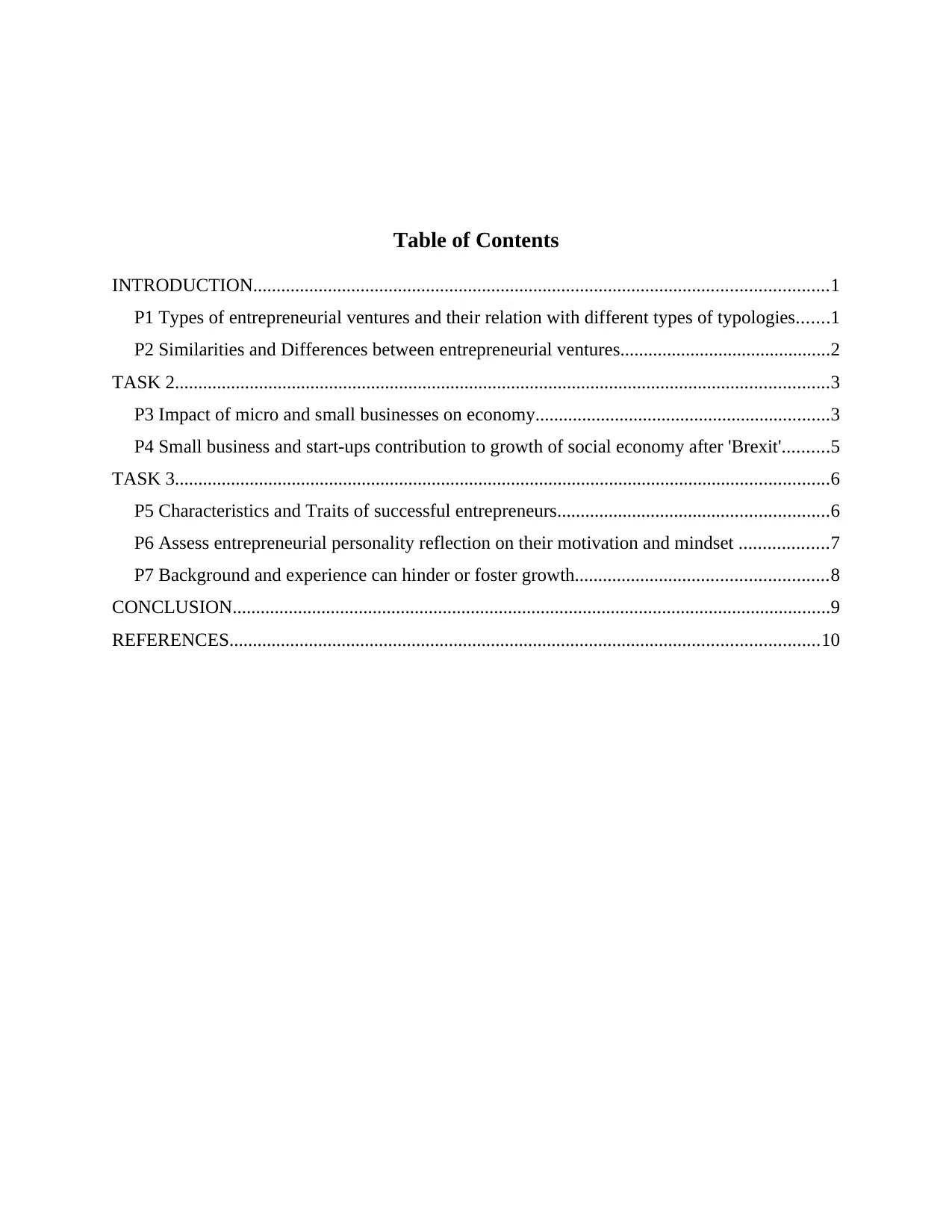
Table of Contents
INTRODUCTION...........................................................................................................................1
P1 Types of entrepreneurial ventures and their relation with different types of typologies.......1
P2 Similarities and Differences between entrepreneurial ventures.............................................2
TASK 2............................................................................................................................................3
P3 Impact of micro and small businesses on economy...............................................................3
P4 Small business and start-ups contribution to growth of social economy after 'Brexit'..........5
TASK 3............................................................................................................................................6
P5 Characteristics and Traits of successful entrepreneurs..........................................................6
P6 Assess entrepreneurial personality reflection on their motivation and mindset ...................7
P7 Background and experience can hinder or foster growth......................................................8
CONCLUSION................................................................................................................................9
REFERENCES..............................................................................................................................10
INTRODUCTION...........................................................................................................................1
P1 Types of entrepreneurial ventures and their relation with different types of typologies.......1
P2 Similarities and Differences between entrepreneurial ventures.............................................2
TASK 2............................................................................................................................................3
P3 Impact of micro and small businesses on economy...............................................................3
P4 Small business and start-ups contribution to growth of social economy after 'Brexit'..........5
TASK 3............................................................................................................................................6
P5 Characteristics and Traits of successful entrepreneurs..........................................................6
P6 Assess entrepreneurial personality reflection on their motivation and mindset ...................7
P7 Background and experience can hinder or foster growth......................................................8
CONCLUSION................................................................................................................................9
REFERENCES..............................................................................................................................10

⊘ This is a preview!⊘
Do you want full access?
Subscribe today to unlock all pages.

Trusted by 1+ million students worldwide
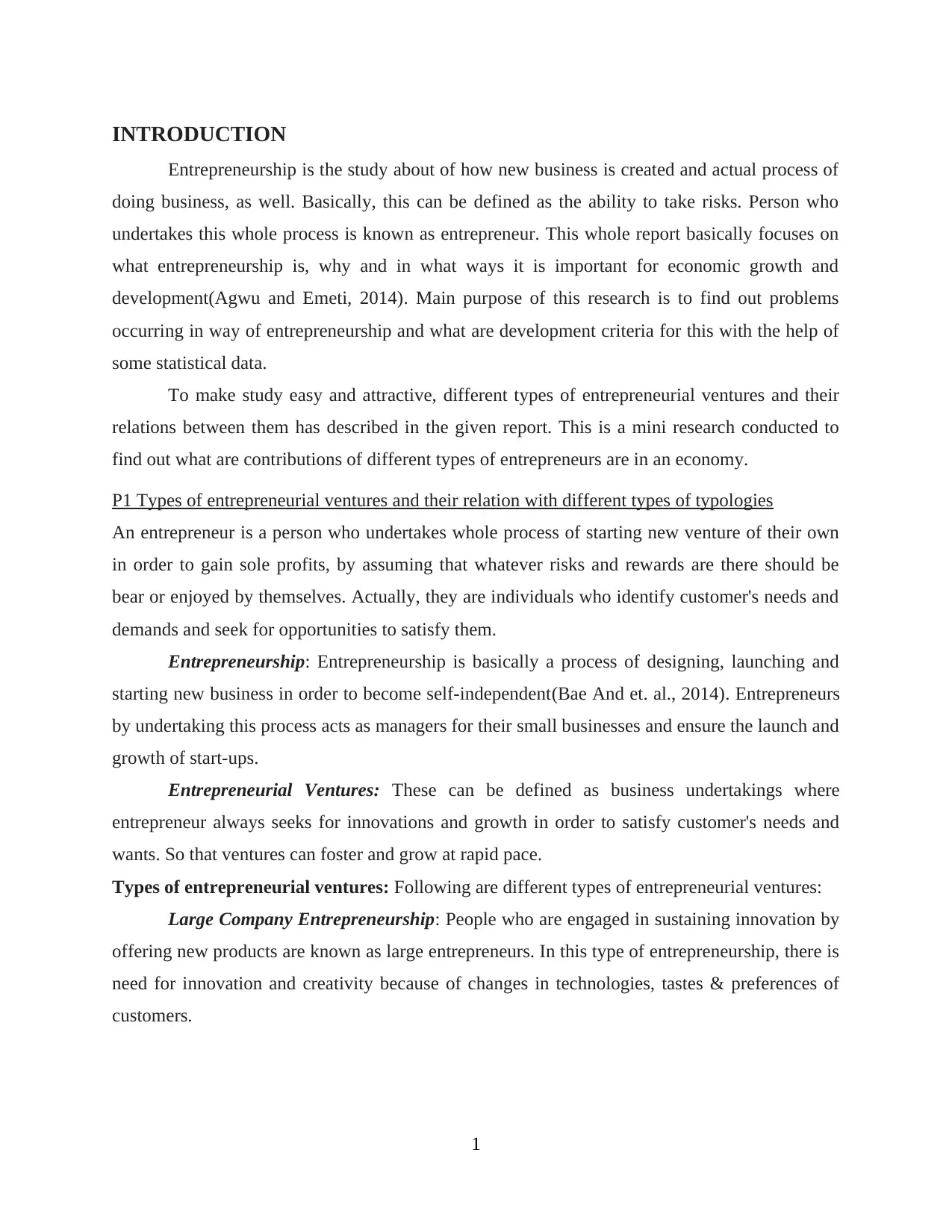
INTRODUCTION
Entrepreneurship is the study about of how new business is created and actual process of
doing business, as well. Basically, this can be defined as the ability to take risks. Person who
undertakes this whole process is known as entrepreneur. This whole report basically focuses on
what entrepreneurship is, why and in what ways it is important for economic growth and
development(Agwu and Emeti, 2014). Main purpose of this research is to find out problems
occurring in way of entrepreneurship and what are development criteria for this with the help of
some statistical data.
To make study easy and attractive, different types of entrepreneurial ventures and their
relations between them has described in the given report. This is a mini research conducted to
find out what are contributions of different types of entrepreneurs are in an economy.
P1 Types of entrepreneurial ventures and their relation with different types of typologies
An entrepreneur is a person who undertakes whole process of starting new venture of their own
in order to gain sole profits, by assuming that whatever risks and rewards are there should be
bear or enjoyed by themselves. Actually, they are individuals who identify customer's needs and
demands and seek for opportunities to satisfy them.
Entrepreneurship: Entrepreneurship is basically a process of designing, launching and
starting new business in order to become self-independent(Bae And et. al., 2014). Entrepreneurs
by undertaking this process acts as managers for their small businesses and ensure the launch and
growth of start-ups.
Entrepreneurial Ventures: These can be defined as business undertakings where
entrepreneur always seeks for innovations and growth in order to satisfy customer's needs and
wants. So that ventures can foster and grow at rapid pace.
Types of entrepreneurial ventures: Following are different types of entrepreneurial ventures:
Large Company Entrepreneurship: People who are engaged in sustaining innovation by
offering new products are known as large entrepreneurs. In this type of entrepreneurship, there is
need for innovation and creativity because of changes in technologies, tastes & preferences of
customers.
1
Entrepreneurship is the study about of how new business is created and actual process of
doing business, as well. Basically, this can be defined as the ability to take risks. Person who
undertakes this whole process is known as entrepreneur. This whole report basically focuses on
what entrepreneurship is, why and in what ways it is important for economic growth and
development(Agwu and Emeti, 2014). Main purpose of this research is to find out problems
occurring in way of entrepreneurship and what are development criteria for this with the help of
some statistical data.
To make study easy and attractive, different types of entrepreneurial ventures and their
relations between them has described in the given report. This is a mini research conducted to
find out what are contributions of different types of entrepreneurs are in an economy.
P1 Types of entrepreneurial ventures and their relation with different types of typologies
An entrepreneur is a person who undertakes whole process of starting new venture of their own
in order to gain sole profits, by assuming that whatever risks and rewards are there should be
bear or enjoyed by themselves. Actually, they are individuals who identify customer's needs and
demands and seek for opportunities to satisfy them.
Entrepreneurship: Entrepreneurship is basically a process of designing, launching and
starting new business in order to become self-independent(Bae And et. al., 2014). Entrepreneurs
by undertaking this process acts as managers for their small businesses and ensure the launch and
growth of start-ups.
Entrepreneurial Ventures: These can be defined as business undertakings where
entrepreneur always seeks for innovations and growth in order to satisfy customer's needs and
wants. So that ventures can foster and grow at rapid pace.
Types of entrepreneurial ventures: Following are different types of entrepreneurial ventures:
Large Company Entrepreneurship: People who are engaged in sustaining innovation by
offering new products are known as large entrepreneurs. In this type of entrepreneurship, there is
need for innovation and creativity because of changes in technologies, tastes & preferences of
customers.
1
Paraphrase This Document
Need a fresh take? Get an instant paraphrase of this document with our AI Paraphraser
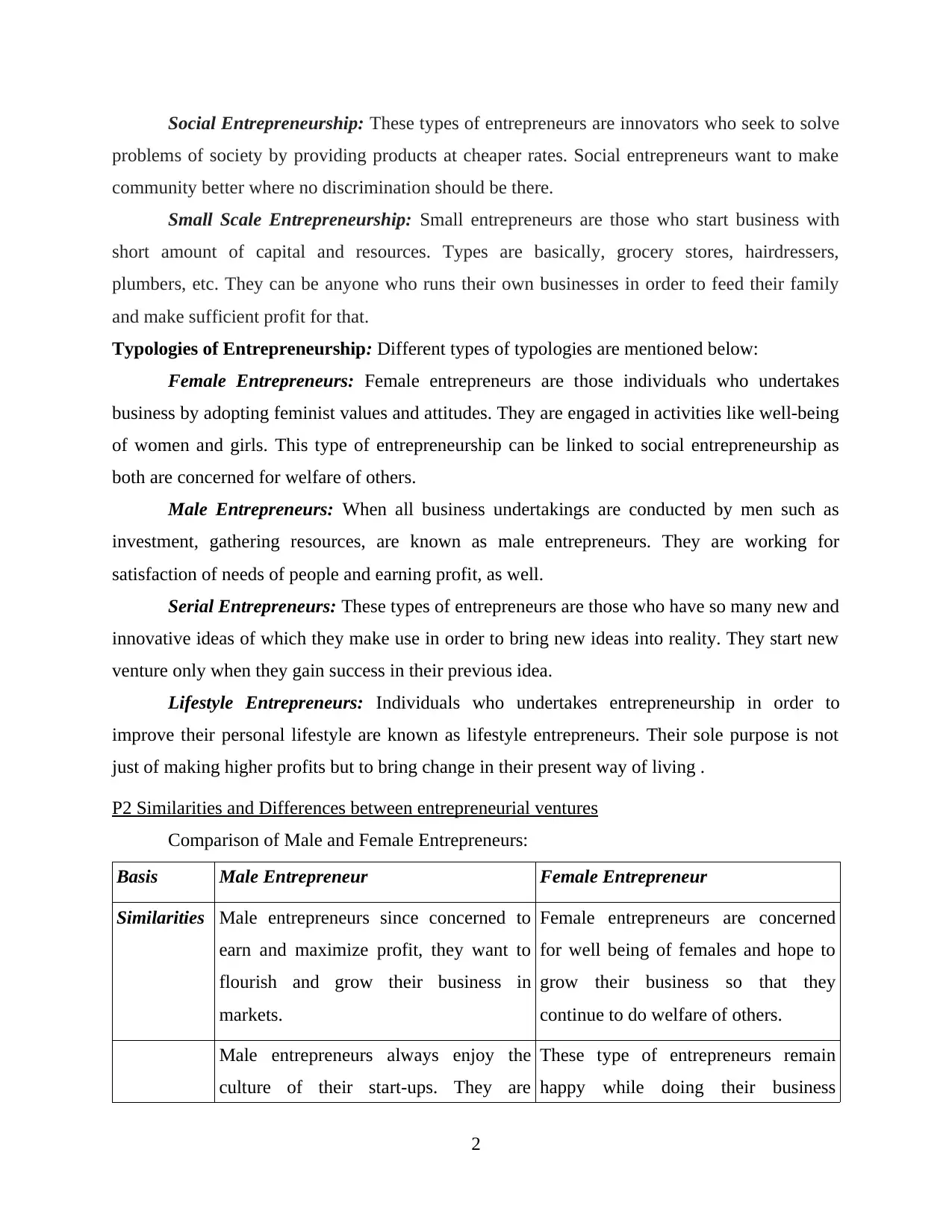
Social Entrepreneurship: These types of entrepreneurs are innovators who seek to solve
problems of society by providing products at cheaper rates. Social entrepreneurs want to make
community better where no discrimination should be there.
Small Scale Entrepreneurship: Small entrepreneurs are those who start business with
short amount of capital and resources. Types are basically, grocery stores, hairdressers,
plumbers, etc. They can be anyone who runs their own businesses in order to feed their family
and make sufficient profit for that.
Typologies of Entrepreneurship: Different types of typologies are mentioned below:
Female Entrepreneurs: Female entrepreneurs are those individuals who undertakes
business by adopting feminist values and attitudes. They are engaged in activities like well-being
of women and girls. This type of entrepreneurship can be linked to social entrepreneurship as
both are concerned for welfare of others.
Male Entrepreneurs: When all business undertakings are conducted by men such as
investment, gathering resources, are known as male entrepreneurs. They are working for
satisfaction of needs of people and earning profit, as well.
Serial Entrepreneurs: These types of entrepreneurs are those who have so many new and
innovative ideas of which they make use in order to bring new ideas into reality. They start new
venture only when they gain success in their previous idea.
Lifestyle Entrepreneurs: Individuals who undertakes entrepreneurship in order to
improve their personal lifestyle are known as lifestyle entrepreneurs. Their sole purpose is not
just of making higher profits but to bring change in their present way of living .
P2 Similarities and Differences between entrepreneurial ventures
Comparison of Male and Female Entrepreneurs:
Basis Male Entrepreneur Female Entrepreneur
Similarities Male entrepreneurs since concerned to
earn and maximize profit, they want to
flourish and grow their business in
markets.
Female entrepreneurs are concerned
for well being of females and hope to
grow their business so that they
continue to do welfare of others.
Male entrepreneurs always enjoy the
culture of their start-ups. They are
These type of entrepreneurs remain
happy while doing their business
2
problems of society by providing products at cheaper rates. Social entrepreneurs want to make
community better where no discrimination should be there.
Small Scale Entrepreneurship: Small entrepreneurs are those who start business with
short amount of capital and resources. Types are basically, grocery stores, hairdressers,
plumbers, etc. They can be anyone who runs their own businesses in order to feed their family
and make sufficient profit for that.
Typologies of Entrepreneurship: Different types of typologies are mentioned below:
Female Entrepreneurs: Female entrepreneurs are those individuals who undertakes
business by adopting feminist values and attitudes. They are engaged in activities like well-being
of women and girls. This type of entrepreneurship can be linked to social entrepreneurship as
both are concerned for welfare of others.
Male Entrepreneurs: When all business undertakings are conducted by men such as
investment, gathering resources, are known as male entrepreneurs. They are working for
satisfaction of needs of people and earning profit, as well.
Serial Entrepreneurs: These types of entrepreneurs are those who have so many new and
innovative ideas of which they make use in order to bring new ideas into reality. They start new
venture only when they gain success in their previous idea.
Lifestyle Entrepreneurs: Individuals who undertakes entrepreneurship in order to
improve their personal lifestyle are known as lifestyle entrepreneurs. Their sole purpose is not
just of making higher profits but to bring change in their present way of living .
P2 Similarities and Differences between entrepreneurial ventures
Comparison of Male and Female Entrepreneurs:
Basis Male Entrepreneur Female Entrepreneur
Similarities Male entrepreneurs since concerned to
earn and maximize profit, they want to
flourish and grow their business in
markets.
Female entrepreneurs are concerned
for well being of females and hope to
grow their business so that they
continue to do welfare of others.
Male entrepreneurs always enjoy the
culture of their start-ups. They are
These type of entrepreneurs remain
happy while doing their business
2
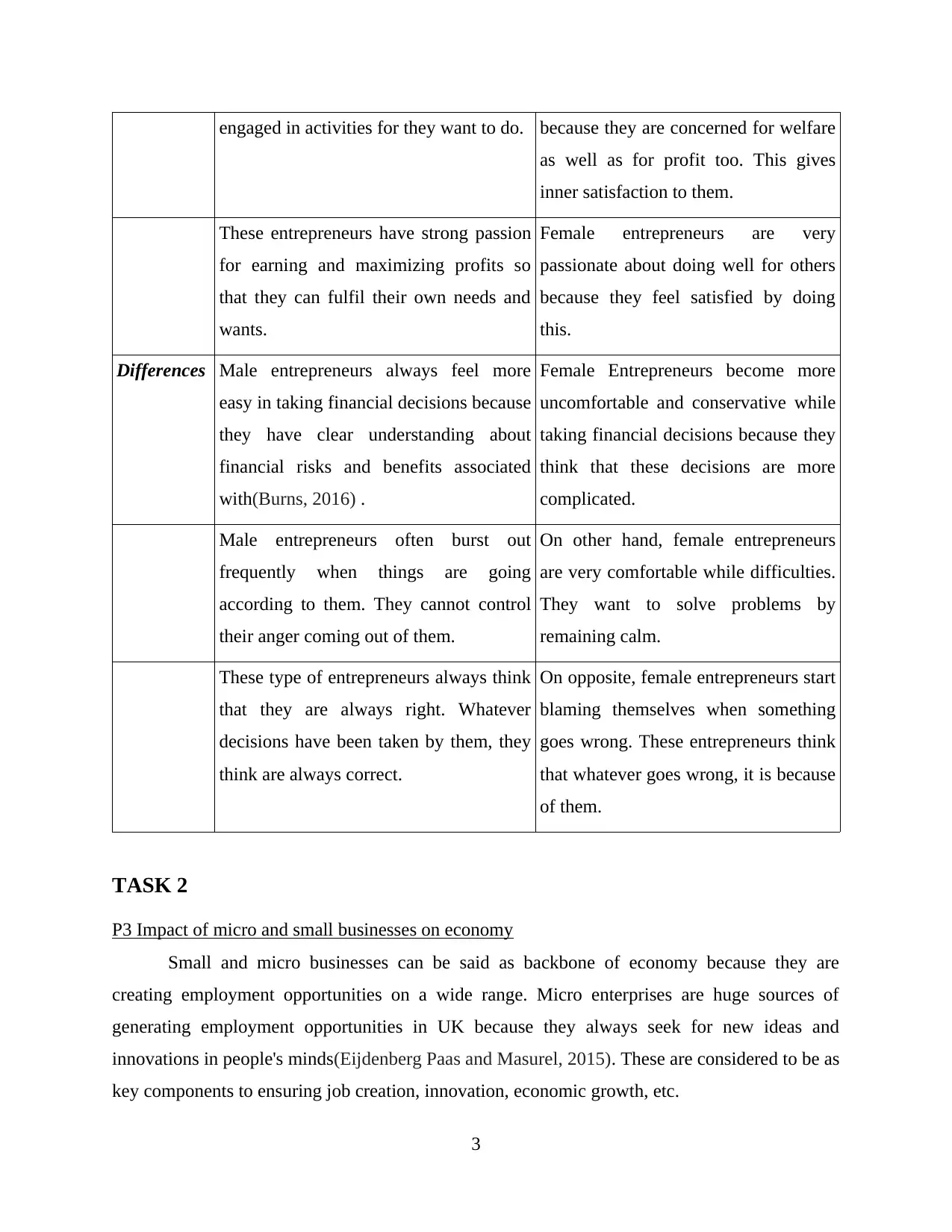
engaged in activities for they want to do. because they are concerned for welfare
as well as for profit too. This gives
inner satisfaction to them.
These entrepreneurs have strong passion
for earning and maximizing profits so
that they can fulfil their own needs and
wants.
Female entrepreneurs are very
passionate about doing well for others
because they feel satisfied by doing
this.
Differences Male entrepreneurs always feel more
easy in taking financial decisions because
they have clear understanding about
financial risks and benefits associated
with(Burns, 2016) .
Female Entrepreneurs become more
uncomfortable and conservative while
taking financial decisions because they
think that these decisions are more
complicated.
Male entrepreneurs often burst out
frequently when things are going
according to them. They cannot control
their anger coming out of them.
On other hand, female entrepreneurs
are very comfortable while difficulties.
They want to solve problems by
remaining calm.
These type of entrepreneurs always think
that they are always right. Whatever
decisions have been taken by them, they
think are always correct.
On opposite, female entrepreneurs start
blaming themselves when something
goes wrong. These entrepreneurs think
that whatever goes wrong, it is because
of them.
TASK 2
P3 Impact of micro and small businesses on economy
Small and micro businesses can be said as backbone of economy because they are
creating employment opportunities on a wide range. Micro enterprises are huge sources of
generating employment opportunities in UK because they always seek for new ideas and
innovations in people's minds(Eijdenberg Paas and Masurel, 2015). These are considered to be as
key components to ensuring job creation, innovation, economic growth, etc.
3
as well as for profit too. This gives
inner satisfaction to them.
These entrepreneurs have strong passion
for earning and maximizing profits so
that they can fulfil their own needs and
wants.
Female entrepreneurs are very
passionate about doing well for others
because they feel satisfied by doing
this.
Differences Male entrepreneurs always feel more
easy in taking financial decisions because
they have clear understanding about
financial risks and benefits associated
with(Burns, 2016) .
Female Entrepreneurs become more
uncomfortable and conservative while
taking financial decisions because they
think that these decisions are more
complicated.
Male entrepreneurs often burst out
frequently when things are going
according to them. They cannot control
their anger coming out of them.
On other hand, female entrepreneurs
are very comfortable while difficulties.
They want to solve problems by
remaining calm.
These type of entrepreneurs always think
that they are always right. Whatever
decisions have been taken by them, they
think are always correct.
On opposite, female entrepreneurs start
blaming themselves when something
goes wrong. These entrepreneurs think
that whatever goes wrong, it is because
of them.
TASK 2
P3 Impact of micro and small businesses on economy
Small and micro businesses can be said as backbone of economy because they are
creating employment opportunities on a wide range. Micro enterprises are huge sources of
generating employment opportunities in UK because they always seek for new ideas and
innovations in people's minds(Eijdenberg Paas and Masurel, 2015). These are considered to be as
key components to ensuring job creation, innovation, economic growth, etc.
3
⊘ This is a preview!⊘
Do you want full access?
Subscribe today to unlock all pages.

Trusted by 1+ million students worldwide
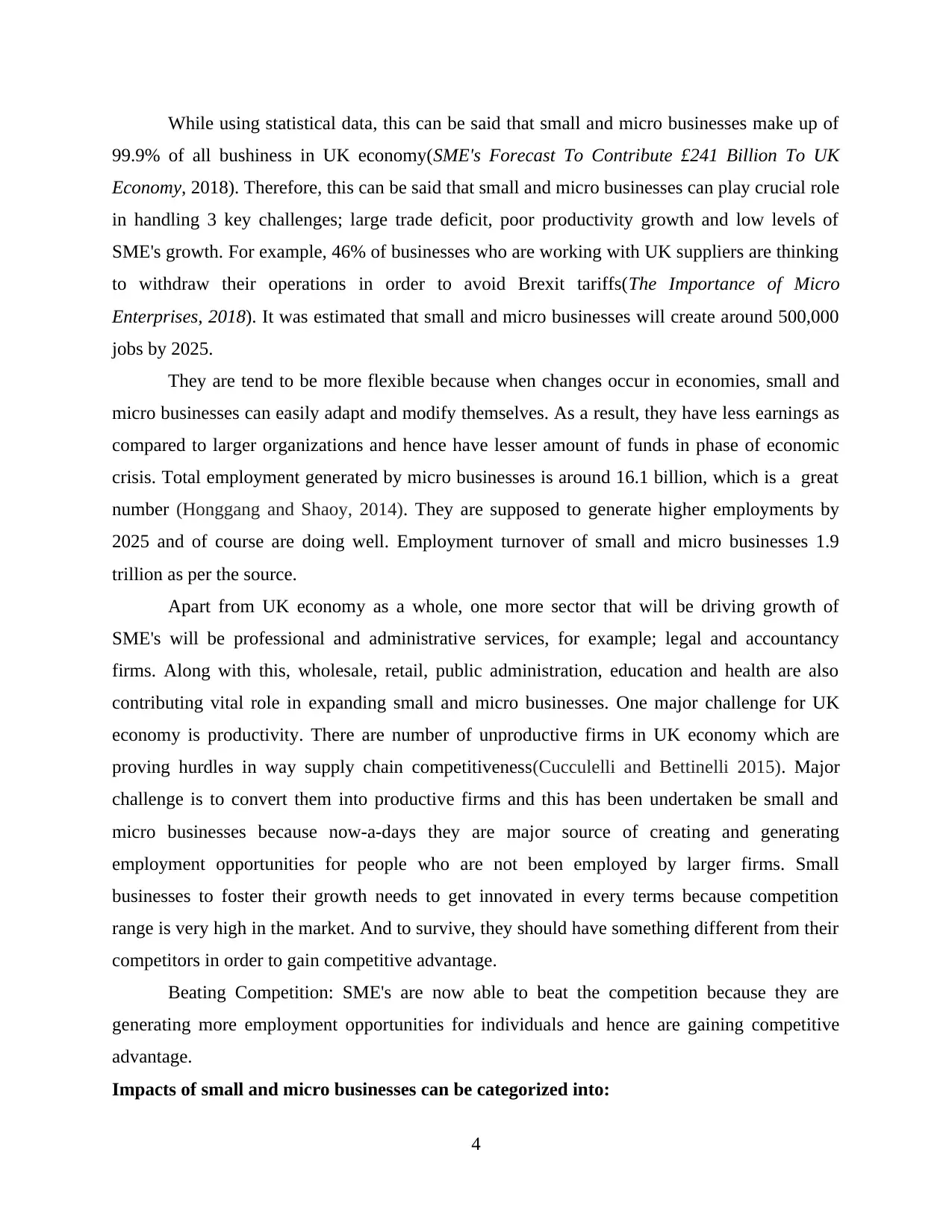
While using statistical data, this can be said that small and micro businesses make up of
99.9% of all bushiness in UK economy(SME's Forecast To Contribute £241 Billion To UK
Economy, 2018). Therefore, this can be said that small and micro businesses can play crucial role
in handling 3 key challenges; large trade deficit, poor productivity growth and low levels of
SME's growth. For example, 46% of businesses who are working with UK suppliers are thinking
to withdraw their operations in order to avoid Brexit tariffs(The Importance of Micro
Enterprises, 2018). It was estimated that small and micro businesses will create around 500,000
jobs by 2025.
They are tend to be more flexible because when changes occur in economies, small and
micro businesses can easily adapt and modify themselves. As a result, they have less earnings as
compared to larger organizations and hence have lesser amount of funds in phase of economic
crisis. Total employment generated by micro businesses is around 16.1 billion, which is a great
number (Honggang and Shaoy, 2014). They are supposed to generate higher employments by
2025 and of course are doing well. Employment turnover of small and micro businesses 1.9
trillion as per the source.
Apart from UK economy as a whole, one more sector that will be driving growth of
SME's will be professional and administrative services, for example; legal and accountancy
firms. Along with this, wholesale, retail, public administration, education and health are also
contributing vital role in expanding small and micro businesses. One major challenge for UK
economy is productivity. There are number of unproductive firms in UK economy which are
proving hurdles in way supply chain competitiveness(Cucculelli and Bettinelli 2015). Major
challenge is to convert them into productive firms and this has been undertaken be small and
micro businesses because now-a-days they are major source of creating and generating
employment opportunities for people who are not been employed by larger firms. Small
businesses to foster their growth needs to get innovated in every terms because competition
range is very high in the market. And to survive, they should have something different from their
competitors in order to gain competitive advantage.
Beating Competition: SME's are now able to beat the competition because they are
generating more employment opportunities for individuals and hence are gaining competitive
advantage.
Impacts of small and micro businesses can be categorized into:
4
99.9% of all bushiness in UK economy(SME's Forecast To Contribute £241 Billion To UK
Economy, 2018). Therefore, this can be said that small and micro businesses can play crucial role
in handling 3 key challenges; large trade deficit, poor productivity growth and low levels of
SME's growth. For example, 46% of businesses who are working with UK suppliers are thinking
to withdraw their operations in order to avoid Brexit tariffs(The Importance of Micro
Enterprises, 2018). It was estimated that small and micro businesses will create around 500,000
jobs by 2025.
They are tend to be more flexible because when changes occur in economies, small and
micro businesses can easily adapt and modify themselves. As a result, they have less earnings as
compared to larger organizations and hence have lesser amount of funds in phase of economic
crisis. Total employment generated by micro businesses is around 16.1 billion, which is a great
number (Honggang and Shaoy, 2014). They are supposed to generate higher employments by
2025 and of course are doing well. Employment turnover of small and micro businesses 1.9
trillion as per the source.
Apart from UK economy as a whole, one more sector that will be driving growth of
SME's will be professional and administrative services, for example; legal and accountancy
firms. Along with this, wholesale, retail, public administration, education and health are also
contributing vital role in expanding small and micro businesses. One major challenge for UK
economy is productivity. There are number of unproductive firms in UK economy which are
proving hurdles in way supply chain competitiveness(Cucculelli and Bettinelli 2015). Major
challenge is to convert them into productive firms and this has been undertaken be small and
micro businesses because now-a-days they are major source of creating and generating
employment opportunities for people who are not been employed by larger firms. Small
businesses to foster their growth needs to get innovated in every terms because competition
range is very high in the market. And to survive, they should have something different from their
competitors in order to gain competitive advantage.
Beating Competition: SME's are now able to beat the competition because they are
generating more employment opportunities for individuals and hence are gaining competitive
advantage.
Impacts of small and micro businesses can be categorized into:
4
Paraphrase This Document
Need a fresh take? Get an instant paraphrase of this document with our AI Paraphraser
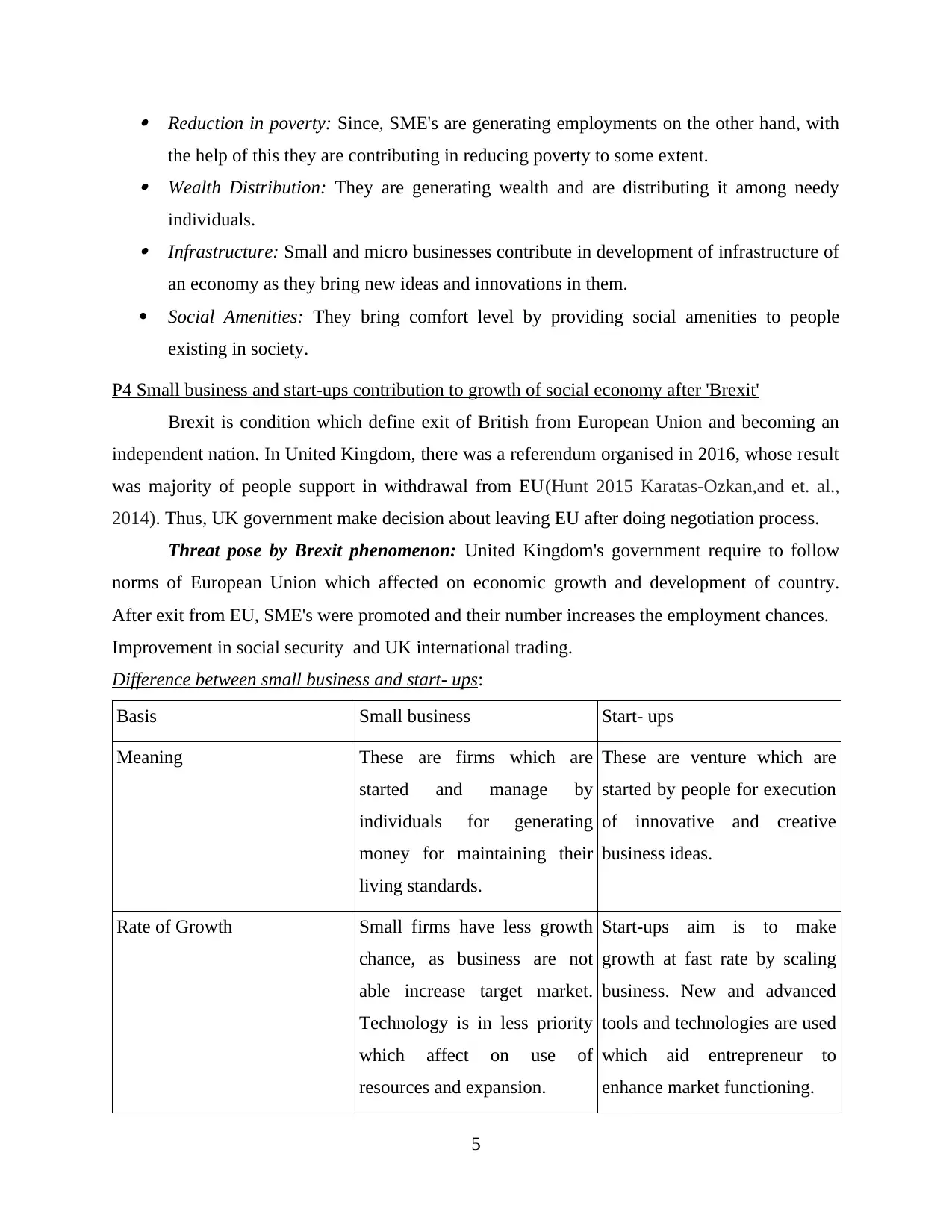
Reduction in poverty: Since, SME's are generating employments on the other hand, with
the help of this they are contributing in reducing poverty to some extent. Wealth Distribution: They are generating wealth and are distributing it among needy
individuals. Infrastructure: Small and micro businesses contribute in development of infrastructure of
an economy as they bring new ideas and innovations in them.
Social Amenities: They bring comfort level by providing social amenities to people
existing in society.
P4 Small business and start-ups contribution to growth of social economy after 'Brexit'
Brexit is condition which define exit of British from European Union and becoming an
independent nation. In United Kingdom, there was a referendum organised in 2016, whose result
was majority of people support in withdrawal from EU(Hunt 2015 Karatas‐Ozkan,and et. al.,
2014). Thus, UK government make decision about leaving EU after doing negotiation process.
Threat pose by Brexit phenomenon: United Kingdom's government require to follow
norms of European Union which affected on economic growth and development of country.
After exit from EU, SME's were promoted and their number increases the employment chances.
Improvement in social security and UK international trading.
Difference between small business and start- ups:
Basis Small business Start- ups
Meaning These are firms which are
started and manage by
individuals for generating
money for maintaining their
living standards.
These are venture which are
started by people for execution
of innovative and creative
business ideas.
Rate of Growth Small firms have less growth
chance, as business are not
able increase target market.
Technology is in less priority
which affect on use of
resources and expansion.
Start-ups aim is to make
growth at fast rate by scaling
business. New and advanced
tools and technologies are used
which aid entrepreneur to
enhance market functioning.
5
the help of this they are contributing in reducing poverty to some extent. Wealth Distribution: They are generating wealth and are distributing it among needy
individuals. Infrastructure: Small and micro businesses contribute in development of infrastructure of
an economy as they bring new ideas and innovations in them.
Social Amenities: They bring comfort level by providing social amenities to people
existing in society.
P4 Small business and start-ups contribution to growth of social economy after 'Brexit'
Brexit is condition which define exit of British from European Union and becoming an
independent nation. In United Kingdom, there was a referendum organised in 2016, whose result
was majority of people support in withdrawal from EU(Hunt 2015 Karatas‐Ozkan,and et. al.,
2014). Thus, UK government make decision about leaving EU after doing negotiation process.
Threat pose by Brexit phenomenon: United Kingdom's government require to follow
norms of European Union which affected on economic growth and development of country.
After exit from EU, SME's were promoted and their number increases the employment chances.
Improvement in social security and UK international trading.
Difference between small business and start- ups:
Basis Small business Start- ups
Meaning These are firms which are
started and manage by
individuals for generating
money for maintaining their
living standards.
These are venture which are
started by people for execution
of innovative and creative
business ideas.
Rate of Growth Small firms have less growth
chance, as business are not
able increase target market.
Technology is in less priority
which affect on use of
resources and expansion.
Start-ups aim is to make
growth at fast rate by scaling
business. New and advanced
tools and technologies are used
which aid entrepreneur to
enhance market functioning.
5
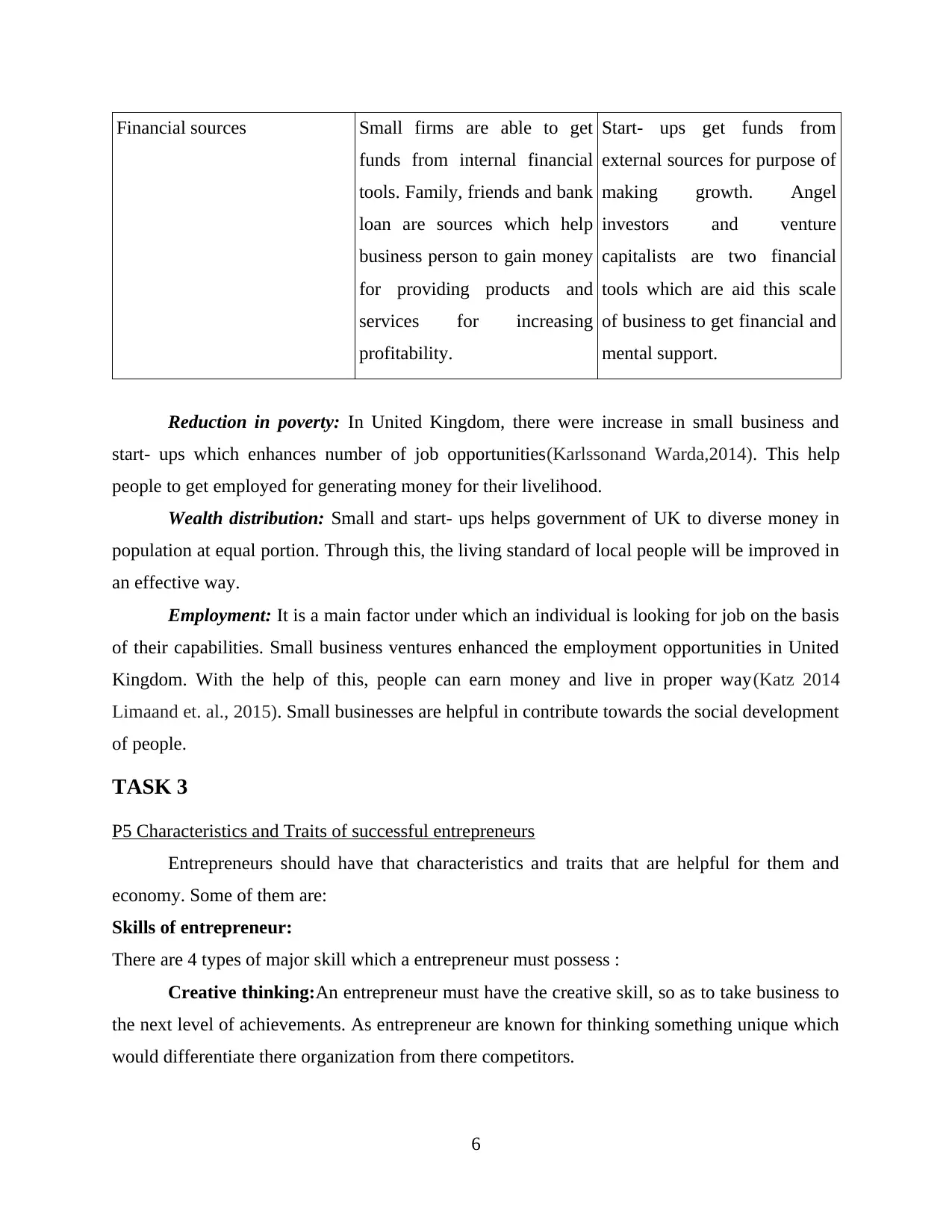
Financial sources Small firms are able to get
funds from internal financial
tools. Family, friends and bank
loan are sources which help
business person to gain money
for providing products and
services for increasing
profitability.
Start- ups get funds from
external sources for purpose of
making growth. Angel
investors and venture
capitalists are two financial
tools which are aid this scale
of business to get financial and
mental support.
Reduction in poverty: In United Kingdom, there were increase in small business and
start- ups which enhances number of job opportunities(Karlssonand Warda,2014). This help
people to get employed for generating money for their livelihood.
Wealth distribution: Small and start- ups helps government of UK to diverse money in
population at equal portion. Through this, the living standard of local people will be improved in
an effective way.
Employment: It is a main factor under which an individual is looking for job on the basis
of their capabilities. Small business ventures enhanced the employment opportunities in United
Kingdom. With the help of this, people can earn money and live in proper way(Katz 2014
Limaand et. al., 2015). Small businesses are helpful in contribute towards the social development
of people.
TASK 3
P5 Characteristics and Traits of successful entrepreneurs
Entrepreneurs should have that characteristics and traits that are helpful for them and
economy. Some of them are:
Skills of entrepreneur:
There are 4 types of major skill which a entrepreneur must possess :
Creative thinking:An entrepreneur must have the creative skill, so as to take business to
the next level of achievements. As entrepreneur are known for thinking something unique which
would differentiate there organization from there competitors.
6
funds from internal financial
tools. Family, friends and bank
loan are sources which help
business person to gain money
for providing products and
services for increasing
profitability.
Start- ups get funds from
external sources for purpose of
making growth. Angel
investors and venture
capitalists are two financial
tools which are aid this scale
of business to get financial and
mental support.
Reduction in poverty: In United Kingdom, there were increase in small business and
start- ups which enhances number of job opportunities(Karlssonand Warda,2014). This help
people to get employed for generating money for their livelihood.
Wealth distribution: Small and start- ups helps government of UK to diverse money in
population at equal portion. Through this, the living standard of local people will be improved in
an effective way.
Employment: It is a main factor under which an individual is looking for job on the basis
of their capabilities. Small business ventures enhanced the employment opportunities in United
Kingdom. With the help of this, people can earn money and live in proper way(Katz 2014
Limaand et. al., 2015). Small businesses are helpful in contribute towards the social development
of people.
TASK 3
P5 Characteristics and Traits of successful entrepreneurs
Entrepreneurs should have that characteristics and traits that are helpful for them and
economy. Some of them are:
Skills of entrepreneur:
There are 4 types of major skill which a entrepreneur must possess :
Creative thinking:An entrepreneur must have the creative skill, so as to take business to
the next level of achievements. As entrepreneur are known for thinking something unique which
would differentiate there organization from there competitors.
6
⊘ This is a preview!⊘
Do you want full access?
Subscribe today to unlock all pages.

Trusted by 1+ million students worldwide
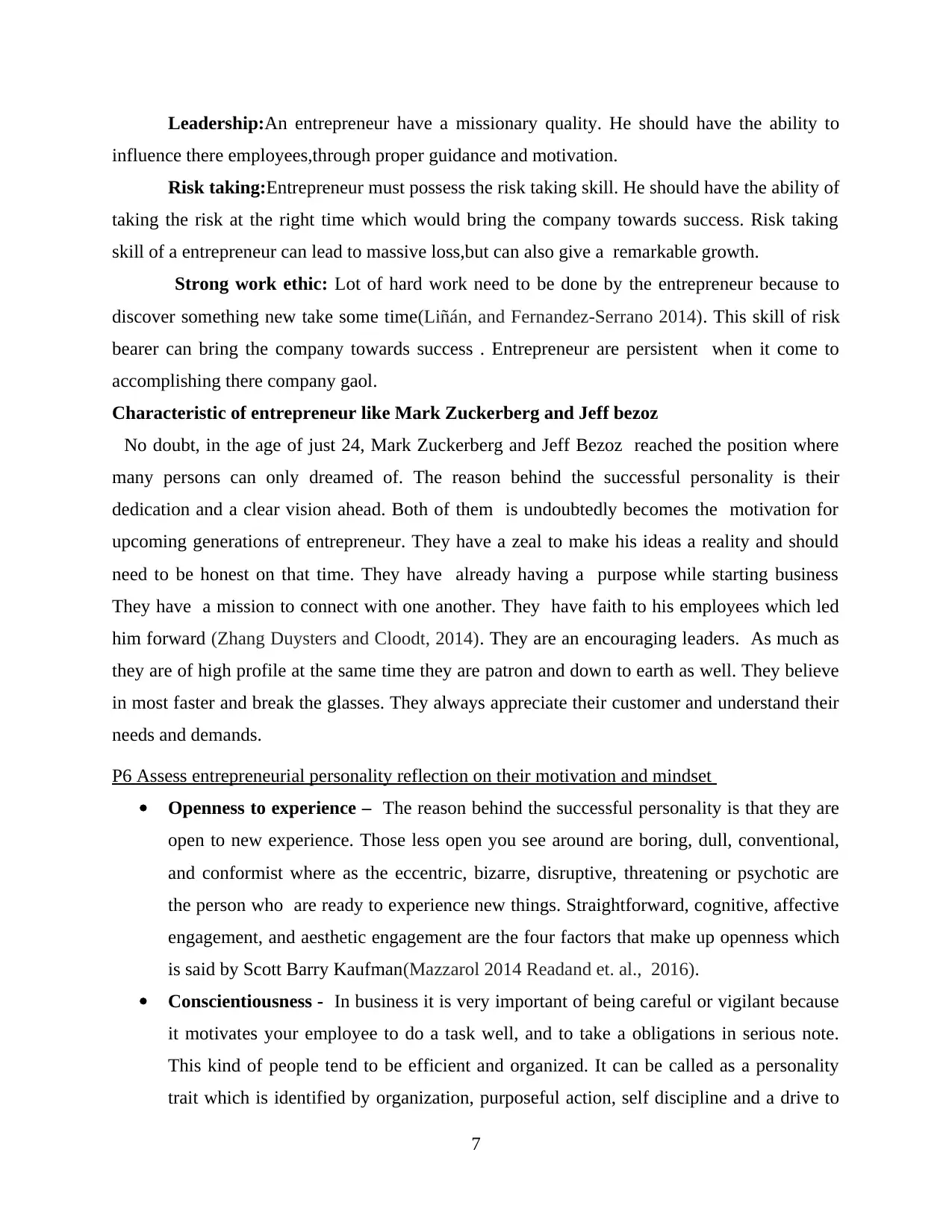
Leadership:An entrepreneur have a missionary quality. He should have the ability to
influence there employees,through proper guidance and motivation.
Risk taking:Entrepreneur must possess the risk taking skill. He should have the ability of
taking the risk at the right time which would bring the company towards success. Risk taking
skill of a entrepreneur can lead to massive loss,but can also give a remarkable growth.
Strong work ethic: Lot of hard work need to be done by the entrepreneur because to
discover something new take some time(Liñán, and Fernandez-Serrano 2014). This skill of risk
bearer can bring the company towards success . Entrepreneur are persistent when it come to
accomplishing there company gaol.
Characteristic of entrepreneur like Mark Zuckerberg and Jeff bezoz
No doubt, in the age of just 24, Mark Zuckerberg and Jeff Bezoz reached the position where
many persons can only dreamed of. The reason behind the successful personality is their
dedication and a clear vision ahead. Both of them is undoubtedly becomes the motivation for
upcoming generations of entrepreneur. They have a zeal to make his ideas a reality and should
need to be honest on that time. They have already having a purpose while starting business
They have a mission to connect with one another. They have faith to his employees which led
him forward (Zhang Duysters and Cloodt, 2014). They are an encouraging leaders. As much as
they are of high profile at the same time they are patron and down to earth as well. They believe
in most faster and break the glasses. They always appreciate their customer and understand their
needs and demands.
P6 Assess entrepreneurial personality reflection on their motivation and mindset
Openness to experience – The reason behind the successful personality is that they are
open to new experience. Those less open you see around are boring, dull, conventional,
and conformist where as the eccentric, bizarre, disruptive, threatening or psychotic are
the person who are ready to experience new things. Straightforward, cognitive, affective
engagement, and aesthetic engagement are the four factors that make up openness which
is said by Scott Barry Kaufman(Mazzarol 2014 Readand et. al., 2016).
Conscientiousness - In business it is very important of being careful or vigilant because
it motivates your employee to do a task well, and to take a obligations in serious note.
This kind of people tend to be efficient and organized. It can be called as a personality
trait which is identified by organization, purposeful action, self discipline and a drive to
7
influence there employees,through proper guidance and motivation.
Risk taking:Entrepreneur must possess the risk taking skill. He should have the ability of
taking the risk at the right time which would bring the company towards success. Risk taking
skill of a entrepreneur can lead to massive loss,but can also give a remarkable growth.
Strong work ethic: Lot of hard work need to be done by the entrepreneur because to
discover something new take some time(Liñán, and Fernandez-Serrano 2014). This skill of risk
bearer can bring the company towards success . Entrepreneur are persistent when it come to
accomplishing there company gaol.
Characteristic of entrepreneur like Mark Zuckerberg and Jeff bezoz
No doubt, in the age of just 24, Mark Zuckerberg and Jeff Bezoz reached the position where
many persons can only dreamed of. The reason behind the successful personality is their
dedication and a clear vision ahead. Both of them is undoubtedly becomes the motivation for
upcoming generations of entrepreneur. They have a zeal to make his ideas a reality and should
need to be honest on that time. They have already having a purpose while starting business
They have a mission to connect with one another. They have faith to his employees which led
him forward (Zhang Duysters and Cloodt, 2014). They are an encouraging leaders. As much as
they are of high profile at the same time they are patron and down to earth as well. They believe
in most faster and break the glasses. They always appreciate their customer and understand their
needs and demands.
P6 Assess entrepreneurial personality reflection on their motivation and mindset
Openness to experience – The reason behind the successful personality is that they are
open to new experience. Those less open you see around are boring, dull, conventional,
and conformist where as the eccentric, bizarre, disruptive, threatening or psychotic are
the person who are ready to experience new things. Straightforward, cognitive, affective
engagement, and aesthetic engagement are the four factors that make up openness which
is said by Scott Barry Kaufman(Mazzarol 2014 Readand et. al., 2016).
Conscientiousness - In business it is very important of being careful or vigilant because
it motivates your employee to do a task well, and to take a obligations in serious note.
This kind of people tend to be efficient and organized. It can be called as a personality
trait which is identified by organization, purposeful action, self discipline and a drive to
7
Paraphrase This Document
Need a fresh take? Get an instant paraphrase of this document with our AI Paraphraser

achieve. It can be measured in degrees like some people are less and some people are
more conscientious than others. For example – one form of conscientiousness is
perfectionism and some believe conscientiousness can lead to compulsions.
Extroversion – It is a behavioural attribute that can be classified by one's sociability,
energy and inclination to experience positive emotions. This kind of personality tends to
be talkative, optimistic and like to roam around with new faces. These kind of persons are
very comfortable around people with they can easily make friends and gossips as well as
they are skilled enough to handle social situations. The best quality of that kind of
personality are they are assertive, active, energetic, upbeat , talkative and optimistic
individual. Their optimistic kind of nature allows them to enhance as group leader. While
dominance , sociability and extraversion are important part which should be in leader.
Agreeableness – It can be considered as a person with high level of agreeableness in a
personality is usually a warm, friendly and tactful. Even they are helpful, friendly,
considerate and generous. These kind of persons should be decent, honest, and
trustworthy.
Neuroticism – It can be called as a person who is emotionally stable and balanced.
Where as sometimes it can be said that the person who has high neuroticism has a
tendency to easily experience negative emotions.
The sub traits of this kind of people are anxiety, anger, depression, self -consciousness,
immoderation and vulnerability(Thorgrenand Wincent, 2015). It has to be believed that a person
who has a high level of emotional stability is preferred in professions because they have more
control over the emotions at work.
P7 Background and experience can hinder or foster growth
Background and experience have a great effect on hinders and foster for
entrepreneur,some of the factors are as follows:
Education : Education factor plays major role for the development of individual as a
entrepreneur. If the individual possess good qualification and skill which an entrepreneur should
have like risk bearer , creative thinking etc. then it will proven to be a hinder for the individual
to become a entrepreneur. If the above mentioned qualification he does not possess the it will be
a foster for the particular individual .
8
more conscientious than others. For example – one form of conscientiousness is
perfectionism and some believe conscientiousness can lead to compulsions.
Extroversion – It is a behavioural attribute that can be classified by one's sociability,
energy and inclination to experience positive emotions. This kind of personality tends to
be talkative, optimistic and like to roam around with new faces. These kind of persons are
very comfortable around people with they can easily make friends and gossips as well as
they are skilled enough to handle social situations. The best quality of that kind of
personality are they are assertive, active, energetic, upbeat , talkative and optimistic
individual. Their optimistic kind of nature allows them to enhance as group leader. While
dominance , sociability and extraversion are important part which should be in leader.
Agreeableness – It can be considered as a person with high level of agreeableness in a
personality is usually a warm, friendly and tactful. Even they are helpful, friendly,
considerate and generous. These kind of persons should be decent, honest, and
trustworthy.
Neuroticism – It can be called as a person who is emotionally stable and balanced.
Where as sometimes it can be said that the person who has high neuroticism has a
tendency to easily experience negative emotions.
The sub traits of this kind of people are anxiety, anger, depression, self -consciousness,
immoderation and vulnerability(Thorgrenand Wincent, 2015). It has to be believed that a person
who has a high level of emotional stability is preferred in professions because they have more
control over the emotions at work.
P7 Background and experience can hinder or foster growth
Background and experience have a great effect on hinders and foster for
entrepreneur,some of the factors are as follows:
Education : Education factor plays major role for the development of individual as a
entrepreneur. If the individual possess good qualification and skill which an entrepreneur should
have like risk bearer , creative thinking etc. then it will proven to be a hinder for the individual
to become a entrepreneur. If the above mentioned qualification he does not possess the it will be
a foster for the particular individual .
8
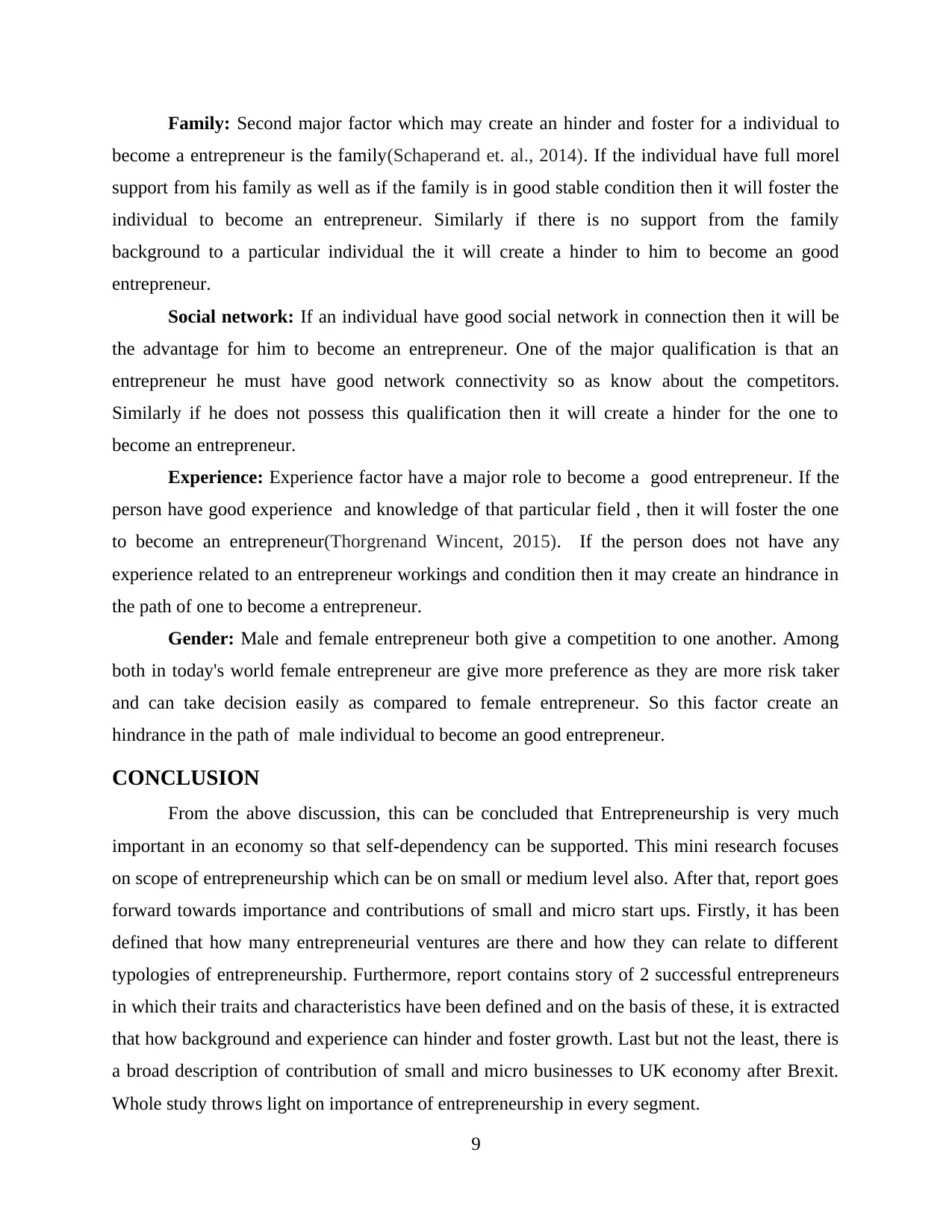
Family: Second major factor which may create an hinder and foster for a individual to
become a entrepreneur is the family(Schaperand et. al., 2014). If the individual have full morel
support from his family as well as if the family is in good stable condition then it will foster the
individual to become an entrepreneur. Similarly if there is no support from the family
background to a particular individual the it will create a hinder to him to become an good
entrepreneur.
Social network: If an individual have good social network in connection then it will be
the advantage for him to become an entrepreneur. One of the major qualification is that an
entrepreneur he must have good network connectivity so as know about the competitors.
Similarly if he does not possess this qualification then it will create a hinder for the one to
become an entrepreneur.
Experience: Experience factor have a major role to become a good entrepreneur. If the
person have good experience and knowledge of that particular field , then it will foster the one
to become an entrepreneur(Thorgrenand Wincent, 2015). If the person does not have any
experience related to an entrepreneur workings and condition then it may create an hindrance in
the path of one to become a entrepreneur.
Gender: Male and female entrepreneur both give a competition to one another. Among
both in today's world female entrepreneur are give more preference as they are more risk taker
and can take decision easily as compared to female entrepreneur. So this factor create an
hindrance in the path of male individual to become an good entrepreneur.
CONCLUSION
From the above discussion, this can be concluded that Entrepreneurship is very much
important in an economy so that self-dependency can be supported. This mini research focuses
on scope of entrepreneurship which can be on small or medium level also. After that, report goes
forward towards importance and contributions of small and micro start ups. Firstly, it has been
defined that how many entrepreneurial ventures are there and how they can relate to different
typologies of entrepreneurship. Furthermore, report contains story of 2 successful entrepreneurs
in which their traits and characteristics have been defined and on the basis of these, it is extracted
that how background and experience can hinder and foster growth. Last but not the least, there is
a broad description of contribution of small and micro businesses to UK economy after Brexit.
Whole study throws light on importance of entrepreneurship in every segment.
9
become a entrepreneur is the family(Schaperand et. al., 2014). If the individual have full morel
support from his family as well as if the family is in good stable condition then it will foster the
individual to become an entrepreneur. Similarly if there is no support from the family
background to a particular individual the it will create a hinder to him to become an good
entrepreneur.
Social network: If an individual have good social network in connection then it will be
the advantage for him to become an entrepreneur. One of the major qualification is that an
entrepreneur he must have good network connectivity so as know about the competitors.
Similarly if he does not possess this qualification then it will create a hinder for the one to
become an entrepreneur.
Experience: Experience factor have a major role to become a good entrepreneur. If the
person have good experience and knowledge of that particular field , then it will foster the one
to become an entrepreneur(Thorgrenand Wincent, 2015). If the person does not have any
experience related to an entrepreneur workings and condition then it may create an hindrance in
the path of one to become a entrepreneur.
Gender: Male and female entrepreneur both give a competition to one another. Among
both in today's world female entrepreneur are give more preference as they are more risk taker
and can take decision easily as compared to female entrepreneur. So this factor create an
hindrance in the path of male individual to become an good entrepreneur.
CONCLUSION
From the above discussion, this can be concluded that Entrepreneurship is very much
important in an economy so that self-dependency can be supported. This mini research focuses
on scope of entrepreneurship which can be on small or medium level also. After that, report goes
forward towards importance and contributions of small and micro start ups. Firstly, it has been
defined that how many entrepreneurial ventures are there and how they can relate to different
typologies of entrepreneurship. Furthermore, report contains story of 2 successful entrepreneurs
in which their traits and characteristics have been defined and on the basis of these, it is extracted
that how background and experience can hinder and foster growth. Last but not the least, there is
a broad description of contribution of small and micro businesses to UK economy after Brexit.
Whole study throws light on importance of entrepreneurship in every segment.
9
⊘ This is a preview!⊘
Do you want full access?
Subscribe today to unlock all pages.

Trusted by 1+ million students worldwide

10
Paraphrase This Document
Need a fresh take? Get an instant paraphrase of this document with our AI Paraphraser
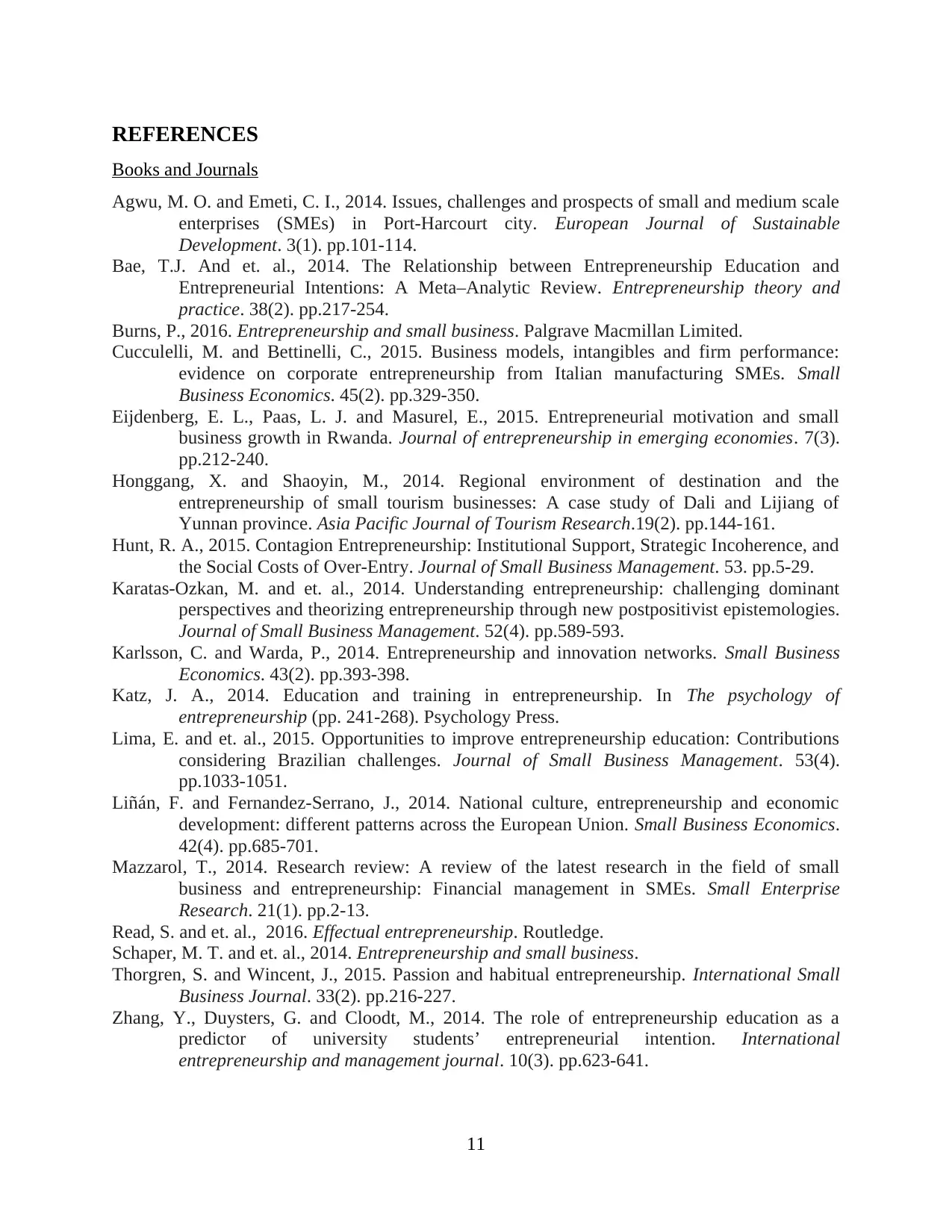
REFERENCES
Books and Journals
Agwu, M. O. and Emeti, C. I., 2014. Issues, challenges and prospects of small and medium scale
enterprises (SMEs) in Port-Harcourt city. European Journal of Sustainable
Development. 3(1). pp.101-114.
Bae, T.J. And et. al., 2014. The Relationship between Entrepreneurship Education and
Entrepreneurial Intentions: A Meta–Analytic Review. Entrepreneurship theory and
practice. 38(2). pp.217-254.
Burns, P., 2016. Entrepreneurship and small business. Palgrave Macmillan Limited.
Cucculelli, M. and Bettinelli, C., 2015. Business models, intangibles and firm performance:
evidence on corporate entrepreneurship from Italian manufacturing SMEs. Small
Business Economics. 45(2). pp.329-350.
Eijdenberg, E. L., Paas, L. J. and Masurel, E., 2015. Entrepreneurial motivation and small
business growth in Rwanda. Journal of entrepreneurship in emerging economies. 7(3).
pp.212-240.
Honggang, X. and Shaoyin, M., 2014. Regional environment of destination and the
entrepreneurship of small tourism businesses: A case study of Dali and Lijiang of
Yunnan province. Asia Pacific Journal of Tourism Research.19(2). pp.144-161.
Hunt, R. A., 2015. Contagion Entrepreneurship: Institutional Support, Strategic Incoherence, and
the Social Costs of Over‐Entry. Journal of Small Business Management. 53. pp.5-29.
Karatas‐Ozkan, M. and et. al., 2014. Understanding entrepreneurship: challenging dominant
perspectives and theorizing entrepreneurship through new postpositivist epistemologies.
Journal of Small Business Management. 52(4). pp.589-593.
Karlsson, C. and Warda, P., 2014. Entrepreneurship and innovation networks. Small Business
Economics. 43(2). pp.393-398.
Katz, J. A., 2014. Education and training in entrepreneurship. In The psychology of
entrepreneurship (pp. 241-268). Psychology Press.
Lima, E. and et. al., 2015. Opportunities to improve entrepreneurship education: Contributions
considering Brazilian challenges. Journal of Small Business Management. 53(4).
pp.1033-1051.
Liñán, F. and Fernandez-Serrano, J., 2014. National culture, entrepreneurship and economic
development: different patterns across the European Union. Small Business Economics.
42(4). pp.685-701.
Mazzarol, T., 2014. Research review: A review of the latest research in the field of small
business and entrepreneurship: Financial management in SMEs. Small Enterprise
Research. 21(1). pp.2-13.
Read, S. and et. al., 2016. Effectual entrepreneurship. Routledge.
Schaper, M. T. and et. al., 2014. Entrepreneurship and small business.
Thorgren, S. and Wincent, J., 2015. Passion and habitual entrepreneurship. International Small
Business Journal. 33(2). pp.216-227.
Zhang, Y., Duysters, G. and Cloodt, M., 2014. The role of entrepreneurship education as a
predictor of university students’ entrepreneurial intention. International
entrepreneurship and management journal. 10(3). pp.623-641.
11
Books and Journals
Agwu, M. O. and Emeti, C. I., 2014. Issues, challenges and prospects of small and medium scale
enterprises (SMEs) in Port-Harcourt city. European Journal of Sustainable
Development. 3(1). pp.101-114.
Bae, T.J. And et. al., 2014. The Relationship between Entrepreneurship Education and
Entrepreneurial Intentions: A Meta–Analytic Review. Entrepreneurship theory and
practice. 38(2). pp.217-254.
Burns, P., 2016. Entrepreneurship and small business. Palgrave Macmillan Limited.
Cucculelli, M. and Bettinelli, C., 2015. Business models, intangibles and firm performance:
evidence on corporate entrepreneurship from Italian manufacturing SMEs. Small
Business Economics. 45(2). pp.329-350.
Eijdenberg, E. L., Paas, L. J. and Masurel, E., 2015. Entrepreneurial motivation and small
business growth in Rwanda. Journal of entrepreneurship in emerging economies. 7(3).
pp.212-240.
Honggang, X. and Shaoyin, M., 2014. Regional environment of destination and the
entrepreneurship of small tourism businesses: A case study of Dali and Lijiang of
Yunnan province. Asia Pacific Journal of Tourism Research.19(2). pp.144-161.
Hunt, R. A., 2015. Contagion Entrepreneurship: Institutional Support, Strategic Incoherence, and
the Social Costs of Over‐Entry. Journal of Small Business Management. 53. pp.5-29.
Karatas‐Ozkan, M. and et. al., 2014. Understanding entrepreneurship: challenging dominant
perspectives and theorizing entrepreneurship through new postpositivist epistemologies.
Journal of Small Business Management. 52(4). pp.589-593.
Karlsson, C. and Warda, P., 2014. Entrepreneurship and innovation networks. Small Business
Economics. 43(2). pp.393-398.
Katz, J. A., 2014. Education and training in entrepreneurship. In The psychology of
entrepreneurship (pp. 241-268). Psychology Press.
Lima, E. and et. al., 2015. Opportunities to improve entrepreneurship education: Contributions
considering Brazilian challenges. Journal of Small Business Management. 53(4).
pp.1033-1051.
Liñán, F. and Fernandez-Serrano, J., 2014. National culture, entrepreneurship and economic
development: different patterns across the European Union. Small Business Economics.
42(4). pp.685-701.
Mazzarol, T., 2014. Research review: A review of the latest research in the field of small
business and entrepreneurship: Financial management in SMEs. Small Enterprise
Research. 21(1). pp.2-13.
Read, S. and et. al., 2016. Effectual entrepreneurship. Routledge.
Schaper, M. T. and et. al., 2014. Entrepreneurship and small business.
Thorgren, S. and Wincent, J., 2015. Passion and habitual entrepreneurship. International Small
Business Journal. 33(2). pp.216-227.
Zhang, Y., Duysters, G. and Cloodt, M., 2014. The role of entrepreneurship education as a
predictor of university students’ entrepreneurial intention. International
entrepreneurship and management journal. 10(3). pp.623-641.
11

Online
SME's Forecast To Contribute £241 Billion To UK Economy. 2018. [Online]. Available
through:<https://www.globalbankingandfinance.com/smes-forecast-to-contribute-241-
billion-to-uk-economy-by-2025/>
The Importance of Micro Enterprises. 2018. [Online]. Available
through:<https://smallbiztrends.com/2012/02/importance-of-micro-enterprises.html>
12
SME's Forecast To Contribute £241 Billion To UK Economy. 2018. [Online]. Available
through:<https://www.globalbankingandfinance.com/smes-forecast-to-contribute-241-
billion-to-uk-economy-by-2025/>
The Importance of Micro Enterprises. 2018. [Online]. Available
through:<https://smallbiztrends.com/2012/02/importance-of-micro-enterprises.html>
12
⊘ This is a preview!⊘
Do you want full access?
Subscribe today to unlock all pages.

Trusted by 1+ million students worldwide
1 out of 15
Related Documents
Your All-in-One AI-Powered Toolkit for Academic Success.
+13062052269
info@desklib.com
Available 24*7 on WhatsApp / Email
![[object Object]](/_next/static/media/star-bottom.7253800d.svg)
Unlock your academic potential
© 2024 | Zucol Services PVT LTD | All rights reserved.





